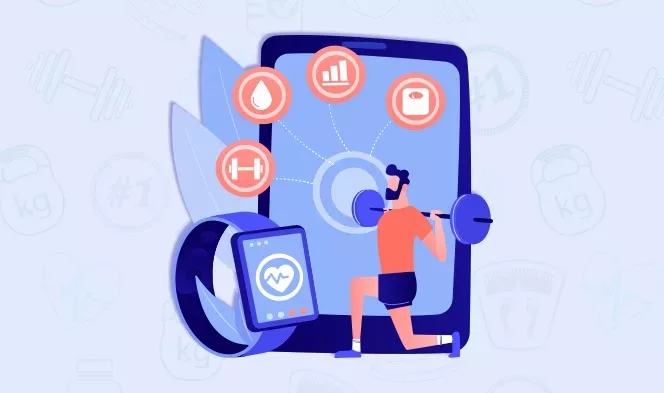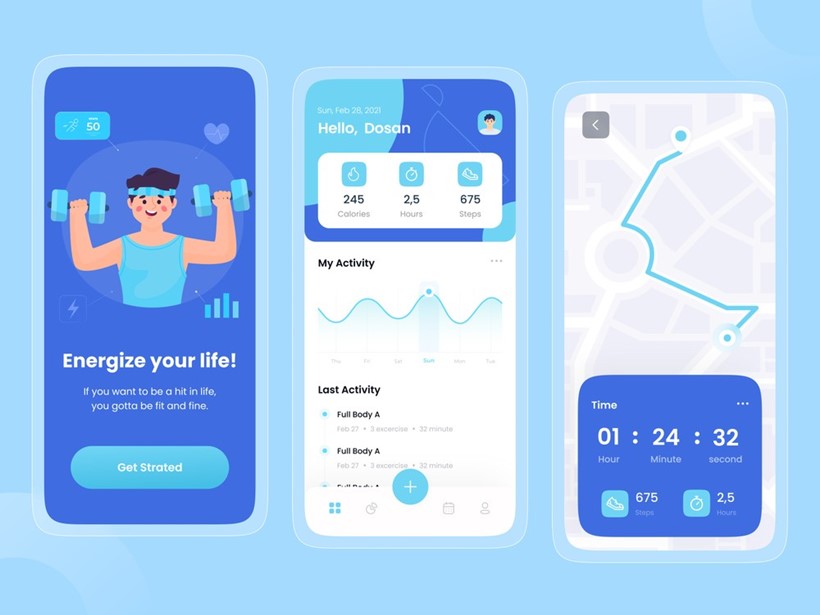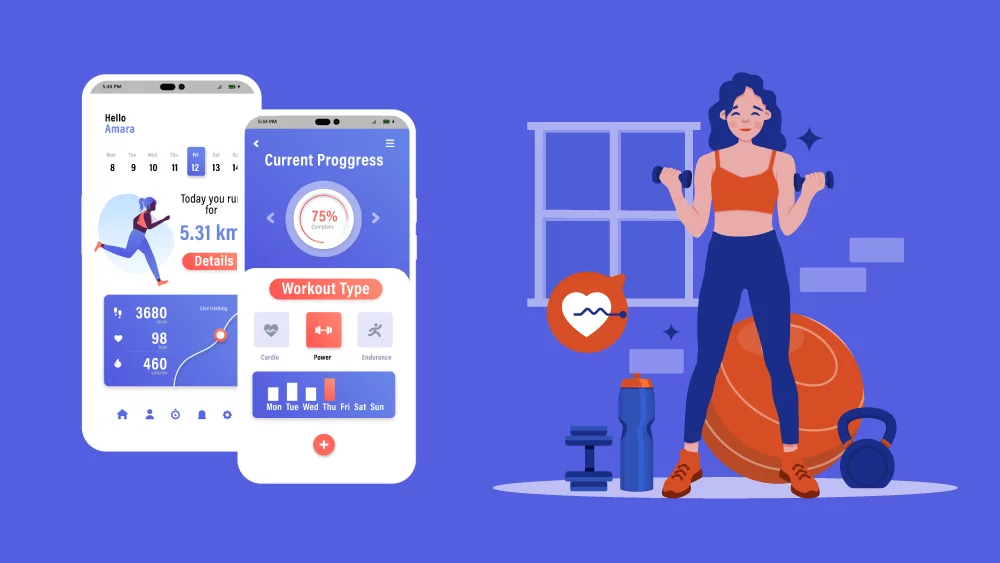As we continue to embrace a more technology-driven lifestyle, the world of fitness apps has seen remarkable growth. With 2025 just around the corner, new fitness apps are emerging with advanced features that integrate seamlessly into our daily lives. Whether you’re an experienced fitness enthusiast or a beginner looking to improve your health, fitness apps provide tools that cater to various needs, from workout tracking and personalized training plans to nutrition advice and mental wellness support.
In this comprehensive review, we’ll explore the top fitness apps of 2025, highlighting their features, pros, cons, and how they can help you achieve a healthier lifestyle. From personalized coaching and workout routines to integrating social features for added motivation, the fitness app landscape is richer than ever. Let’s dive into the top contenders.

1. MyFitnessPal: The Ultimate Nutrition & Fitness Tracker
Features:
MyFitnessPal has been a long-time favourite for tracking both nutrition and exercise. The app provides a database of over 11 million foods, enabling users to track their daily calorie intake with ease. Whether you’re eating out, preparing meals at home, or on the go, MyFitnessPal lets you scan barcodes or search for items to log your food.
Additionally, the app integrates seamlessly with other fitness apps and devices, like Fitbit, Apple Health, and Google Fit, making it an excellent choice for users who want an all-in-one tool for tracking their progress.
Pros:
- Extensive food database for easy meal tracking.
- Integration with other fitness apps and devices.
- Customizable daily goals for calorie intake, macro breakdown, and more.
- Support for various fitness goals, including weight loss, muscle gain, and maintenance.
Cons:
- Some advanced features require a paid subscription.
- The app’s food database isn’t always 100% accurate, which can lead to tracking errors.
Best For:
Anyone looking to combine nutrition tracking with fitness tracking to meet weight loss, muscle gain, or overall health goals.
2. Peloton: Fitness Classes Anytime, Anywhere
Features:
Peloton is not just a stationary bike brand; it has evolved into one of the top fitness apps of 2025, offering on-demand workouts across a wide range of categories. From cycling and running to strength training, yoga, and meditation, Peloton offers live and on-demand classes with expert instructors. The app also features customized workout plans and challenges, which can be motivating for users of all fitness levels.
Peloton’s community-driven approach allows users to join live classes and interact with others via leaderboards, making it easy to stay connected and motivated. The app also offers personalized workout suggestions based on your goals and preferences.
Pros:
- A large library of on-demand classes across multiple fitness categories.
- Personalized workout plans based on individual goals.
- A highly engaging community feature with live classes and challenges.
- High-quality instructors who provide motivation and guidance.
Cons:
- Requires a subscription to access most features, and the premium subscription can be expensive.
- Some classes, like the cycling classes, require additional equipment.
Best For:
People who enjoy structured, instructor-led fitness classes and a strong sense of community.
3. Fitbod: Personalized Strength Training at Your Fingertips
Features:
Fitbod is a great option for users looking to focus on strength training and building muscle. The app uses machine learning algorithms to design personalized workout routines based on your strength training goals, available equipment, and fitness level. As you log your workouts, Fitbod adapts your training plan to ensure progress, helping you avoid plateaus.
One of the key features of Fitbod is its ability to track your workouts by muscle group, ensuring that you target specific areas of your body for balanced muscle development. The app also provides detailed insights into your progress, including weight lifted, volume, and workout intensity.
Pros:
- Customized strength training routines based on user progress.
- Detailed progress tracking and analytics.
- Effective for those looking to build muscle or improve strength.
- Minimal equipment is required for at-home workouts.
Cons:
- The free version offers limited features; a subscription is required for full access.
- The app can be overwhelming for beginners who are unfamiliar with strength training.
Best For:
Intermediate to advanced gym-goers or anyone focused on strength training and muscle building.
4. Strava: The Social Fitness Network
Features:
Strava is a favourite among runners, cyclists, and outdoor fitness enthusiasts. The app tracks your runs, cycling routes, and other outdoor activities with high accuracy. What sets Strava apart from other fitness apps is its social networking feature, which allows you to share your workouts, cheer on friends, and join challenges.
Strava offers detailed data on pace, distance, elevation, and calories burned, making it a powerful tool for athletes looking to optimize their performance. It also includes a feature called “Segments,” where users can compete on specific sections of routes, providing an additional layer of motivation.
Pros:
- Ideal for outdoor activities like running, cycling, and hiking.
- Robust tracking features with detailed insights.
- The social aspect allows users to interact with friends and join challenges.
- Provides competitive features with Segments for additional motivation.
Cons:
- Advanced features, like heart rate monitoring and detailed analytics, require a premium subscription.
- Lacks comprehensive workout plans for users seeking full-body training.
Best For:
Outdoor enthusiasts, athletes, and anyone looking to add a social component to their fitness journey.
5. Headspace: Mental Health Meets Fitness
Features:
While fitness apps traditionally focus on physical workouts, Headspace is a standout for its focus on mental health and well-being. In 2025, mental fitness is just as important as physical fitness, and Headspace offers guided meditation, mindfulness exercises, and sleep support to help users manage stress and improve their mental clarity.
With personalized meditation plans based on user goals—whether it’s reducing stress, improving sleep, or increasing focus—Headspace provides a holistic approach to fitness. The app also includes specialized content for athletes, helping them enhance performance through mental training.
Pros:
- Extensive library of guided meditations and mindfulness exercises.
- Personalized meditation plans based on specific goals.
- Focus on mental health, stress management, and sleep quality.
- Special programs for athletes to enhance performance.
Cons:
- Some features require a premium subscription.
- Not focused on physical fitness or workouts.
Best For:
Anyone looking to improve mental well-being, reduce stress, and enhance overall fitness through mindfulness and meditation.
6. Aaptiv: Audio-Based Workouts for Busy Lifestyles
Features:
Aaptiv is an audio-based fitness app that offers a wide variety of workouts, including running, strength training, yoga, and cycling. What sets Aaptiv apart is its focus on audio instructions, which means you can follow along with your workouts without needing to look at your phone or screen.
The app offers tailored workout plans based on your fitness goals and provides both live and on-demand classes. Whether you’re working out at home or the gym, Aaptiv’s audio cues keep you motivated and guide you through every movement.
Pros:
- Ideal for users who prefer audio-guided workouts rather than video-based classes.
- Provides a variety of workouts across different fitness levels.
- Customizable workout plans based on personal goals.
- Great for multitaskers who want to work out while doing other tasks.
2025 VR Headsets Reviewed: The Future of Immersive Technology
Cons:
- Lacks visual demonstrations, which may make some exercises difficult for beginners to follow.
- Subscription-based, which can add up over time.
Best For:
People with busy lifestyles prefer audio-guided workouts for convenience and flexibility.
7. Nike Training Club: Free Workouts from the Experts
Features:
Nike Training Club (NTC) offers one of the best free fitness app experiences. The app features a wide variety of workouts, including strength, endurance, yoga, and mobility exercises. Nike has partnered with professional trainers to bring expert-led, high-quality workout routines to users of all fitness levels.
NTC also includes premium features such as personalized fitness plans, live classes, and advanced tracking tools, though most content is available for free. The app’s workout library is vast, and its focus on bodyweight exercises makes it perfect for home workouts.
Pros:
- High-quality, expert-led workouts, many of which are free.
- Variety of workouts and training plans.
- Great for home-based workouts with minimal equipment required.
- Customizable fitness plans based on personal goals.
Cons:
- The free version doesn’t include all the features, and the premium subscription can be expensive.
- Limited advanced tracking features compared to other apps.
Best For:
Budget-conscious individuals who want high-quality, expert-led workouts without paying for a subscription.

8. Jefit: Your Workout Log and Tracker
Features:
Jefit is a comprehensive fitness app that provides workout tracking and customizable training plans for bodybuilding and general fitness. The app features a large exercise database, workout plans, and the ability to log progress with every set and rep.
Jefit also provides detailed statistics on your workout history, tracking your strength and endurance progress over time. It’s an ideal app for users who want to track their workout routines down to the smallest detail and improve their performance.
Pros:
- Extensive exercise library with video demonstrations.
- In-depth workout tracking and progress analytics.
- Customizable workout plans for strength training and fitness goals.
- Free version with a lot of features.
Cons:
- Some features, like advanced tracking and additional plans, require a premium subscription.
- The interface can be a bit overwhelming for beginners.
Best For:
Fitness enthusiasts love tracking every detail of their workouts and need a detailed exercise library.
Finding the Right Fitness App for You
In 2025, the fitness app market is filled with diverse options, each catering to specific fitness goals and preferences. Whether you’re looking for comprehensive workout plans, mental health support, or nutrition tracking, there is an app designed to help you achieve your personal health and fitness objectives.
When choosing a fitness app, consider your goals—whether it’s losing weight, building muscle, or improving mental well-being—and your preferred workout style. Many of these apps offer free trials, so don’t hesitate to explore a few to find the one that works best for you.
With the right app and a consistent routine, a healthier, fitter lifestyle is just a few taps away!





